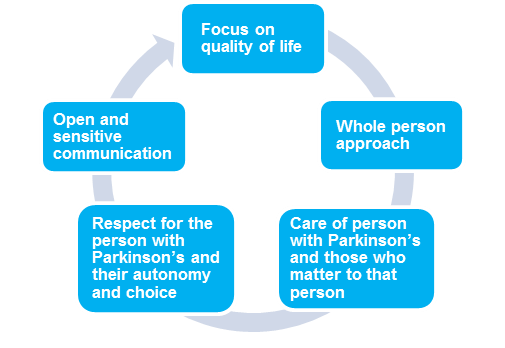2.4 What are the principles of end of life care?
These principles are useful to guide health and social care professionals in the delivery of best practice, high quality end of life care for people with Parkinson’s.
Principles of end of life care
A focus on quality of life involves good symptom control, relief from pain and other distressing symptoms.
A whole person approach takes into account the person’s past life experience and current situation.
The care of people with Parkinson’s and those who matter to that person promotes an awareness of the needs of the family and/or carer due to major changes in their life.
Respect for the person with Parkinson’s and their autonomy and choice recognises that timely information promotes educated choices about treatment options, and allows discussion about advanced care documents and preferred place of care.
Open and sensitive communication will prompt discussion on advance care planning issues, personal feelings and family relationships. It is important that family and/or carers have their opportunity to express their feelings too.
Reflective exercise
Reflect on these principles of palliative and end of life care within your care setting. In your reflection log, record the key words that you believe summarise how you would approach palliative and end of life care.
Discussion
In your reflection you may have considered the following:
Holistic approach – both to the client and the ethos of care. Holistic will incorporate the physical, spiritual, psychological and social care needs of the client.
Multidisciplinary team approach – the skill mix of the team will be used to manage the client’s and their family's needs.
Person-centred care – the client’s wishes and needs are at the centre of the care planning.
Autonomy – the team will recognise the client’s right to decide and will provide them with the information to enable an informed choice.
Quality of life – the aim of holistic care is to provide improved quality of life through control of symptoms and rehabilitation.
Respectful and trusting relationships – with the client and those important to them.
Interprofessional communication – is important to promote co-ordinated and dynamic delivery of care.
Support network – using statutory, voluntary and community groups/services to provide comprehensive support for the client and family and/or carers.
2.3 What is the definition of end of life?

